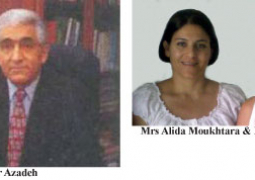"The all-Merciful; he taught the Quran; created man; and taught him utterance." (The Quran; LV, 1-4)
The holy Quran verse above describes how the blessing of talking - one of the most glorious divine blessings ever endowed unto mankind - was initiated, to serve as a natural bridge through which the people and the generations' thoughts and ideas would reach one another. Thus, the objective behind man's creation - perfection on the one hand, and construction of the world towards advancement and development on the other hand - would both be achieved.
The holy Quran verse above describes how the blessing of talking - one of the most glorious divine blessings ever endowed unto mankind - was initiated, to serve as a natural bridge through which the people and the generations' thoughts and ideas would reach one another. Thus, the objective behind man's creation - perfection on the one hand, and construction of the world towards advancement and development on the other hand - would both be achieved.
Thus, the divinely endowed blessing of talking completes the other blessing of being created, in a bid to be facilitated as a connection ring linking the people's minds with one another, and regulating the course of their thoughts. The importance of talking is appreciating to an extend that some people have even assumed that a language is "the" means for talking, without which no intellectual activity would be possible. We are, of course, not agreed with that assumption, because it is actually the thoughts that lead to the invention of languages. We also believe that beyond doubt the clarity and richness of the symbols used in each language provide the appropriate atmosphere for the growth, perfection, and logical strength of thoughts of the people that speak that language.
A language is thus a means for enrichment of the thoughts while the thoughts, too, are like bridges that assist man to rid himself of the cage of his own segregated being. Then, relying on his innate talents that are granted to man by Almighty Allah (SWT) ever since the first day of his creation, he passes through that bridge as a balanced, goal-oriented, and ideal human being.
These innate talents lead a man towards entering a world that is much vaster than his own restricted surroundings, or the outside world, talking advantage of which and relying on his faith, he can achieve a greater reality, that is none but the existence of the entire great universe, and the most splendid fact, its great Creator, without whom the entire philosophy of existence would be put under a big question mark.
Human being talks, doubt, discuss, and have the right to do so: "And man is more than anything else, contentious." (The Quran, XV111, 54)
As the holy verse reiterates, the most popular type of conversation for the people is entering debates, and that is because man is in pursuit of the absolute truth, trying to realize it resorting to sound logic, so that he can extend it to his entire existence and thus achieve peace of mind: "God said (to Abraham) Do you not believe (in resurrection)? He answered: I surely do, but (I ask you for its demonstration) so that my heart would be at ease. (The Quran 11,260)
Islamic texts and teachings that have taught us these facts have also promoted the culture of holding dialogues aimed at achieving the truth, understanding the others and making oneself understood, convincing and being convinced as a means for the establishment of relations among human beings and friendship bonds among civilizations. Dialogue is meanwhile a means for influencing others and for having reciprocal and constructive cooperation in order to grasp the realities of universe: "So that he who would perish might perish on clear proof and he who would survive might survive by clear proof." (The Quran. V111, 42)
And all these argumentations would be complete relying on guidance of prophets {PBUT} on behalf of Almighty Allah {SWT}, so that no human being would have any pretext in the Hereafter: "... In order that mankind might have no arguments against Allah after the messengers." (The Quran 1V, 165)
This is an obvious call for entire mankind to think logically, and to yield to sound logic in the course of holding dialogues in which freedom of expression would be fully observed, since forcing the people to obey amid a tense atmosphere, misleading propagation, threats, and bribing, is the method applied by corrupt oppressor powers: "Allah is the Protecting Friend of those who believe and brings them out of darkness into light. But as for those who disbelieve, their patrons are false deities, who bring them out of light into darkness." (The Quran, 11,257)
That is the glorious path that would lead the mankind towards well being in this world, and eternal salvation in the Hereafter.
It would definitely be a great mistake to assume that only the weak would yield to holding dialogues. It is not so, since quite on the contrary, holding dialogues is the approach of those whose reasoning is firm and truly logical. The side that assumes that his stands are righteous or that he possesses precious gems, would never fear taking part in a test, and enjoys such courage that even if he has mistakes he would revise his viewpoints.
Islam and Jurisprudence
Issuance of religious verdicts on all personal and public affairs based on the rich Islamic sources, and within its natural framework, has been quite permitted, after considering all aspects of the matter, ever since the advent of Islam.
Full certainty in issuance of such religious verdicts and refraining from making wild guesses is a bare necessity.
Thus, Islam, as a solid school of thought that is devised for an eternal period and the entire mankind, has realistically adopted a flexible and lenient approach towards life in which all complicated developments throughout different eras can be taken into account in the issuance of such verdicts.
Having sources of jurisprudence is an inescapable necessity, since neither faith, nor man-made laws can regulate without such sources? assistance. If they intend to regulate the affairs in a society for a long period faultlessly. On that basis, there are varying thoughts and viewpoints. Different religions, too, approach the matter differently and such differences comprise the wealth of each faith in turn, adding to the richness of the civilizations to which they belong. If the Holy Quran warns the Muslims in particular, and the entire mankind in general, against disputes it is not only because such disputes can be troublesome in the course of issuance of verdicts. Disputes over major decision makings, too, can lead to separation of societies into various groups and harm them.
On that basis, we can come up with the conclusion that the establishment of different Islamic schools of thought has natural and scientific bases, although it is not possible to ignore the role played by systematic policies that have boosted the emergence of such divisions. So long as differences in religions remain within the hypothetical framework they are all right, quite natural, and positive moves, as a sign of dynamism, freedom and lenience.
Yet, at any rate, sorrowfully there are various factors involved in this process, leading to deviation of it from pursuing its original objectives, and to turning the natural religious differences of opinion into the scene of antagonist sectarian clashes. Bloods and tear drops are thus shed, and suffering lots of pain follows, while the result is the weakening, separation, and endless disputes within this Ummah of Prophet Mohammad (PBUH).
There are many factors in turning the religious differences of opinion into sectarian tendencies and tribal clashes, among which we refer only to a few hereunder:
1. Ignorance and unawareness (that are the root causes for many troubles)
2. Blind prejudice
3. Political incentives of the corrupt rulers
4. The insular interests of the opportunists
5. Presence of inefficient, or spiritually weak people at sensitive position of issuing religious decrees
6. Foreign enemies' interference, etc.
Of course we do not mean to present a complete list of such factors, since the main point is referring to a great historic deviation from the right Path. We do so in order to correct that deviation back to its normal and original route, and to save the Ummah from its hazardous effects. Restless efforts of Scholars and selfless officials are needed in order to correct such a lethal historic error.
Importance of such efforts is of double importance today due to the current status and the existence of discord and disputes among Muslims that are numerous, the efforts of Islam?s sworn enemies that are highly intensified. As the holy Quran stresses, "And those who disbelieve are protectors of one another - If you do not do so as well, there will be confusion in the land, and great corruption." (The Quran V111, 73)
To be continued
This Article is written by: Ayatollah Mohammad- Ali Taskhiri.
The Secretary General of World Forum for Proximity of Islamic Schools of Thought.
To know more about it see Al- Taqrib Journal



